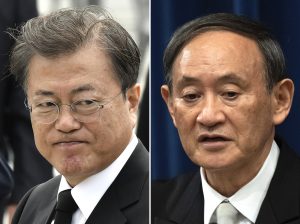With the inauguration of the new Biden administration approaching, America’s East Asian allies are beginning to turn their attention to Japan–South Korea relations. The new administration has announced its intention to bolster relations with allies and although we don’t yet know if it will be using the term Free and Open Indo-Pacific (FOIP), we can expect it to emphasize security in the Indo-Pacific with China in mind. Given that, South Korea’s attitude is a matter of concern. South Korea is not only distancing itself from FOIP but is also displaying relative indifference to any vision of regional security outside the Korean peninsula.
The basis of South Korean foreign policy and especially that of the Moon Jae-in administration can be said to be its North Korea policy. The principal issues appear to be unification and dialogue with North Korea. This is why Seoul has been passive on FOIP and other regional visions. Even when visiting Southeast Asia, President Moon Jae-in did not mention FOIP. This contrasts significantly with former Prime Minister Abe Shinzo and his successor Suga Yoshihide.
One reason why South Korea may be cool on FOIP is that it is perceived to have emanated from a proposal by Abe. These issues in Japan–South Korea relations may also color Seoul’s thinking on other regional visions. With Abe having stepped down, it is not surprising then that many people see an opportunity to improve Japan–South Korea relations. Apparently, this thinking is present in Washington as well. The U.S. State Department was actually making plans to draw the South Korean government and South Korea towards the FOIP toward the end of the Trump administration. And with the U.K. likewise starting to develop a new Indo-Pacific policy, it too could serve as a mediator for better Japan–South Korea relations.
A Japan–South Korea telephone summit was held in September. During the call, Suga noted the importance of the bilateral relationship, perhaps suggesting a policy of giving South Korea more emphasis than the Abe administration did. Yet since then Suga has only referred to Japan–US–South Korea collaboration on the North Korea issues, while maintaining Abe’s policy on matters such as the wartime Korean labor. Suga spoke about the wartime labor issue and other sensitive aspects of Japan–South Korea relations to a delegation of South Korean lawmakers visiting Japan in connection with the Korea–Japan Forum held in November, saying that he “would like to see action on the South Korean side to improve bilateral relations.” This appears to suggest a proactive approach to better ties, but it can also be taken to indicate that he sees the cause of worsening relations as lying with South Korea.
That attitude is unlikely to go down well in South Korea. Yet the September call was initiated by Seoul, so perhaps South Korean is also looking for ways to improve relations. It remains difficult, however, to know just how motivated it is, either when it comes to Japan or the trilateral relationship with the U.S. and South Korea.
As things stand, China and North Korea seem to be getting on well. China continues to prop up the North Korean economy and likewise extended a helping hand following the natural disasters and food shortages that occurred in the wake of the multiple typhoons that hit the country in 2020. The 70th Anniversary of the Korean War may well be used to showcase robust relations between the two countries. In any case, China has a stronger pipeline to North Korea than the U.S. does. For the Moon Jae-in administration, this means that China is more “dependable” than the U.S. is, since Moon considers Korean unification and dialogue with North Korea his foremost tasks.
Of course, China won’t necessarily to dance to South Korea’s tune. But since Beijing wants to distance the U.S. from its allies within the region, while encouraging schisms among the regional allies themselves, it would very likely welcome rapprochement with South Korea. What should be remembered, though, is that Beijing will only act in its own interests. Moon should recall the experience of the Park Geun-hye administration, which had its own plans for China but got nowhere with them.
As the COVID-19 pandemic continues to rage in many parts of the region, China is stepping up its activities in nearby waters and border areas, while deploying more vigorous policy measures toward its neighbors. Those neighbors are now confronted with heavy pressure from Beijing and may be feeling the pressure to rethink their regional relations and the regional order.
Northeast Asia is a key part of the FOIP strategy. For the strategy to produce results, Japan and South Korea face major tasks rebuilding trust, achieving consensus on the world situation, and resetting common goals amid the perception gaps and misunderstandings that currently prevail.
Shin Kawashima is a professor at the University of Tokyo.

































